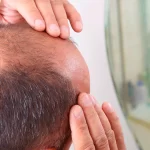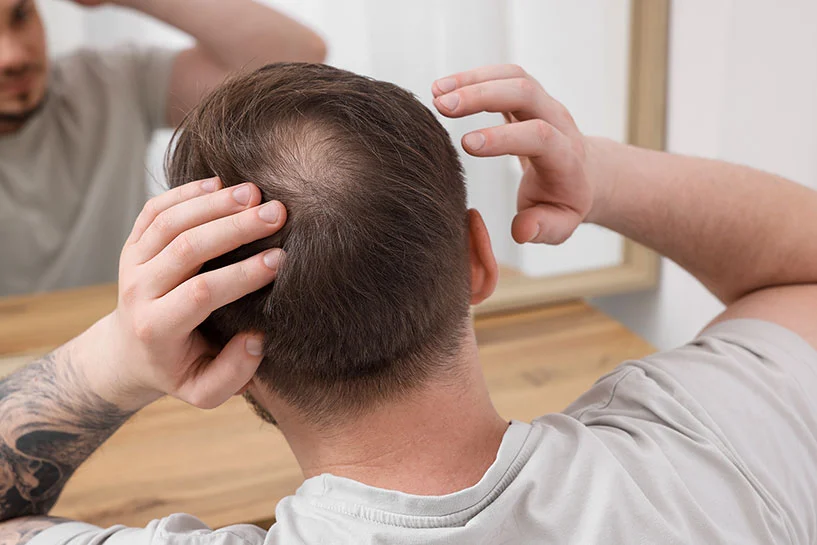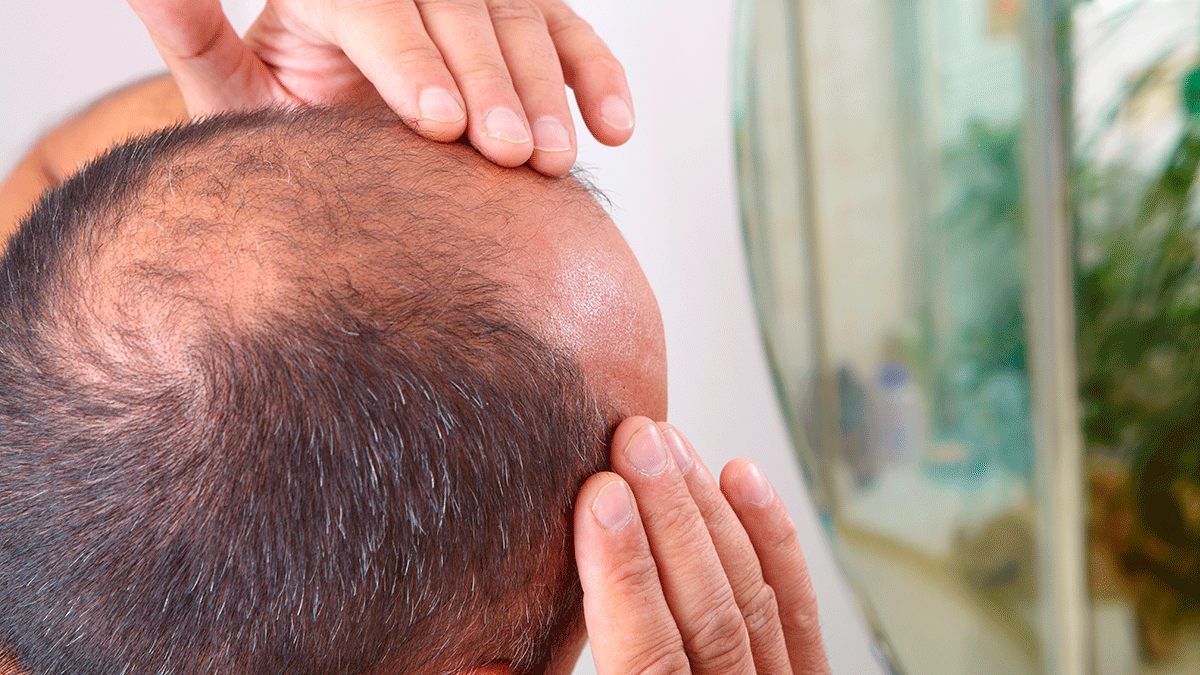Table of Contents
ToggleHypothyroidism is usually linked to weight gain, but some people notice weight loss instead. The answer to “why am I losing weight with hypothyroidism?” is often connected to medication dosage, stomach issues, or other health conditions. While not common, it can happen when thyroid problems interact with other factors. Knowing the reasons helps with proper care, and seeing a doctor is always best.
At Kopelman Hair, we support patients facing hair, weight, and hormone concerns. With more than 40 years of combined experience, Dr. Kopelman and his team provide trusted guidance for those living with thyroid and related issues.
Key Takeaways
- Weight loss in hypothyroidism is rare but can happen from medicine, stomach problems, or other conditions.
- Can hypothyroidism cause weight loss? Not directly – it usually comes from other causes.
- Patients asking does hypothyroidism causes weight loss should know it is often linked to related factors, not the thyroid alone.
- Seeing a doctor is important if weight changes happen fast or without a clear reason.
- With expert care from Dr. Kopelman, patients can manage thyroid symptoms and protect their health.
Can Hypothyroidism Cause Weight Loss?
Typical effects on body weight
Hypothyroidism slows the body down. Most people gain weight because their thyroid is underactive, and they burn fewer calories. This is why many are surprised when they lose weight instead.
Why weight loss may still happen
Weight loss can still occur. It may come from appetite loss, poor food absorption, or other health problems. Stress and eating less can also cause weight to drop.
For example, someone with both hypothyroidism and celiac disease may eat normally but still lose weight because their body does not absorb food well. Another patient might take too much thyroid medicine and start to show signs of hyperthyroidism, which can also cause weight loss.
Does hypothyroidism cause weight loss directly?
In most cases, hypothyroidism does not cause weight loss by itself. It usually happens from side effects, other conditions, or the treatment plan.
Causes of Weight Loss
Metabolism and hormone fluctuations
Thyroid hormones control how food becomes energy, so even small changes may affect weight. These imbalances can also influence hair growth, leading to shedding or thinning. You can read more in our guide on hair loss due to hormones. Shifts between an underactive thyroid and an overactive phase can also cause weight loss.
Weight loss in hypothyroidism vs hyperthyroidism
Hyperthyroidism is strongly tied to fast weight loss. In some cases, people with hypothyroidism lose weight because their treatment puts them in a hyperthyroid state.
Studies show people with untreated hyperthyroidism may lose 5 to 10 percent of body weight in a few months. By contrast, weight loss in hypothyroidism is rare unless another problem exists. Regular checks help prevent these swings.
Coexisting conditions and digestive problems
Autoimmune conditions that attack your thyroid, such as Hashimoto’s disease, may also appear alongside hypothyroidism and contribute to weight instability. These conditions are also linked to autoimmune hair loss in women, showing how thyroid disease can affect both weight and hair health.
These are all part of the broader group of thyroid disease conditions that affect millions of people worldwide.
Weight Loss From Hypothyroid Medicine
Why am I losing weight with hypothyroid medicine?
Many patients ask: why am I losing weight with hypothyroid medicine after starting treatment?. The reason is that thyroid replacement drugs can sometimes raise metabolism too much if the dose is high.

Medication dosage and overcorrection
When medicine doses are too strong, the body may act like it has hyperthyroidism. Common symptoms include weight loss, anxiety, and a fast heartbeat. Adjusting the dose with a doctor’s help usually fixes this.
Best thyroid medication for weight loss
There is no best thyroid medication for weight loss. The goal of hormone replacement is to balance the body, not to change weight. Levothyroxine is the standard drug for an underactive thyroid, used as part of replacement therapy to restore thyroid function. Any changes to dosage should only be done with medical advice.
Other Health Complications Connected to Hypothyroidism
Weight is just one part of thyroid health. Hypothyroidism can also affect the heart, fertility, and mental health. These problems can happen with both weight loss and weight gain.
Patients often notice fatigue, memory problems, or mood changes. Others may have irregular periods, high cholesterol, or swelling. Dry skin and hair changes are also common.
A blood test that measures thyroid-stimulating hormone TSH helps doctors confirm thyroid function. Without treatment, hypothyroidism can sometimes cause life-threatening problems like myxedema, though this is very rare.
Can Hypothyroidism Weight Loss Affect Hair?
Weight loss with hypothyroidism is often linked to poor nutrient absorption or hormone imbalance. Both can affect hair health, since the thyroid gland plays a key role in controlling hair growth cycles. When thyroid function is low or unstable, hair may shed more easily or grow back thinner. Learn more about the connection in our article on weight loss and hair loss.
Autoimmune thyroid disease, such as Hashimoto’s disease, can also trigger both weight changes and hair loss. In these cases, the immune system attacks your thyroid and disrupts multiple processes in the body. Patients may notice thinning at the scalp, eyebrows, or other areas alongside unexplained weight shifts.

At Kopelman Hair, Dr. Kopelman has seen how thyroid disease can affect both weight and hair health. For patients facing these combined concerns, proper diagnosis and treatment not only restore balance but also support stronger, healthier hair growth.
When to Seek Medical Advice
Weight loss with hypothyroidism should always be checked by a doctor. Seek care if the change is sudden, extreme, or comes with symptoms like a fast heartbeat, diarrhea, or fatigue. Dr. Kopelman stresses the need for proper testing to find the real cause.
Doctors also look at risk factors, such as family history, autoimmune conditions, or radiation exposure. These can raise the chance of thyroid problems and related weight changes.
Treatment and Support
Adjusting thyroid medication
If medicine is causing weight loss, a doctor can lower or adjust the dose. Blood tests track thyroid levels and keep them in a safe range.
Can thyroid medication help with weight management?
Thyroid medicine is not meant for weight loss. It helps restore thyroid function so the body can work normally. Most patients see their weight stabilize when their hormones are balanced.
Nutritional and lifestyle support
A healthy diet, regular exercise, and stress control help patients stay stable. Small, frequent meals and enough fluids can reduce symptoms. Doctors also monitor the thyroid gland to keep hormone levels steady.
FAQs About Hypothyroidism and Weight Loss
Why do some people lose weight instead of gain with hypothyroidism?
This may happen if another illness is present, or if medicine doses are too strong. It is not the usual outcome.
Is sudden weight loss with hypothyroidism dangerous?
Yes. It may mean a problem with medication or another illness. This should be checked by a doctor right away.
Will my weight return to normal with treatment?
Most people regain balance once their thyroid levels are treated. With ongoing care and healthy habits, weight usually stabilizes.
If you are noticing both weight changes and hair thinning with hypothyroidism, don’t ignore the signs. Schedule a consultation with Dr. Kopelman at Kopelman Hair to get expert care that supports your thyroid health and restores your hair confidence.

























